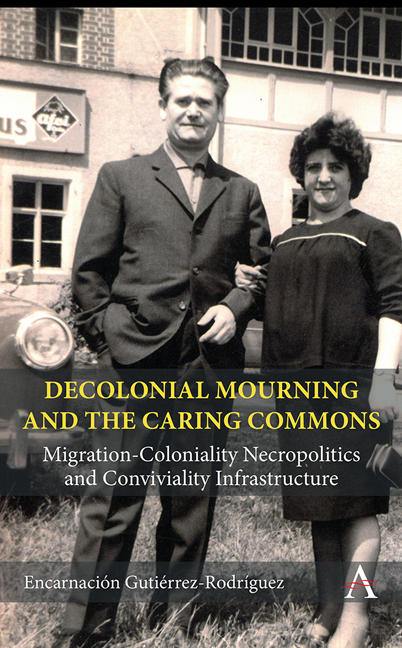 Decolonial Mourning and the Caring Commons
Decolonial Mourning and the Caring Commons Book contents
- Frontmatter
- Contents
- Acknowledgments
- 1 Introduction: Entangled Mournings
- 2 Trauerarbeit: Decolonial Mourning
- 3 Political Mourning
- 4 Countering Necropolitical Social Reprodution
- 5 Accountable Mourning: Bearing Witness
- 6 Communal Mourning: Becoming-With
- 7 Mourning’s Justice: Conviviality Infrastructure of a Caring Commons
- Notes on Author
- References
- Index
1 - Introduction: Entangled Mournings
Published online by Cambridge University Press: 29 February 2024
- Frontmatter
- Contents
- Acknowledgments
- 1 Introduction: Entangled Mournings
- 2 Trauerarbeit: Decolonial Mourning
- 3 Political Mourning
- 4 Countering Necropolitical Social Reprodution
- 5 Accountable Mourning: Bearing Witness
- 6 Communal Mourning: Becoming-With
- 7 Mourning’s Justice: Conviviality Infrastructure of a Caring Commons
- Notes on Author
- References
- Index
Summary
heimkehr, traueratem
einen augenblick einsamer
atmet oleander
vor dem gittertor jasmin
einen augenblick einsamer
atmet
der zikadensang
einen augenblick einsamer
kindstage aus:
ganz abgeschiedener sommer
ganz nachtgeborene notkunft
ganz luftgewobene trauer
das grab zum dichten nah
(Oliver 1997, 26)On 21 June 2015, I walked down the sunny streets of Frankfurt. It was a pleasant day, but I knew that nothing would ever be the same again because my father, Juan José Gutiérrez Cabello, had died at midnight. Scarcely two years later, I lost my mother, Josefa Rodríguez Santana, as well. My father had wanted to die in his village, Bollullos de la Mitación, in the Spanish province of Seville, but my parents’ lives ended in Germany, where they had arrived as Gastarbeiter (guest workers) in the 1960s. Since their passing, I have been inhabited by mourning—embedded in my everyday, mundane activities. In this journey, my eyes have been opened to different articulations of political work, embracing the communal labor of mourning.
This book is the product of an endless, individual and collective, process of mourning. It engages with decolonial mourning by bearing witness to the political grief work of contemporary struggles against migration-coloniality necropolitics. It departs from the mourning for my parents, their histories and struggles in Germany as Gastarbeiter, while it also engages with the struggles against necroborders in Europe; the intersectional feminist movements against feminicide in Central and South America or Abya Yala; the struggles against state and police misogynoir violence of #SayHerName4 in the United States; and the resistance of refugees and migrantized5 people against the coloniality of migration in Germany. Here, in particular, I attend to the intense political grief work of families, relatives and friends who have lost their loved ones in racist attacks from the 1980s until today. I have read blogs, homepages and newsletters; listened to podcasts, webinars and Sound Cloud episodes; and attended—and sometimes organized—gatherings, rallies, political events and lectures. I have paid close attention to how families, relatives and friends articulate, analyze and grapple with their respective experiences of loss. My mourning has been traversed by their grieving practices; their thoughts have nourished my seeing. It is in this entanglement of affect and thought—thinking through feeling, or sentipensar—that I have borne witness to their accounts. Sentipensar has theoretically and methodologically textured my path through the political labor of mourning as the presenting of those lost.
- Type
- Chapter
- Information
- Decolonial Mourning and the Caring CommonsMigration-Coloniality Necropolitics and Conviviality Infrastructure, pp. 1 - 28Publisher: Anthem PressPrint publication year: 2023
